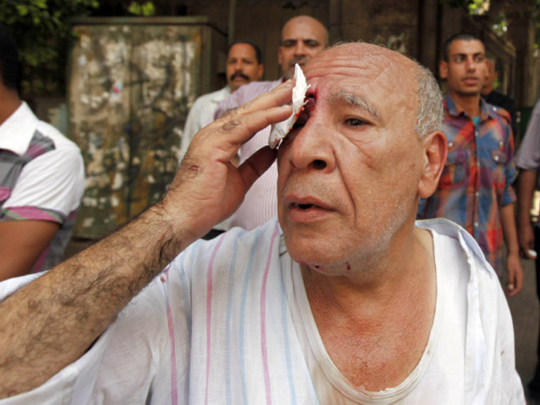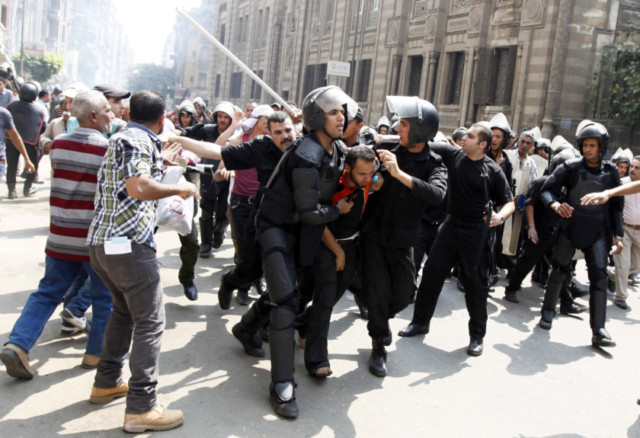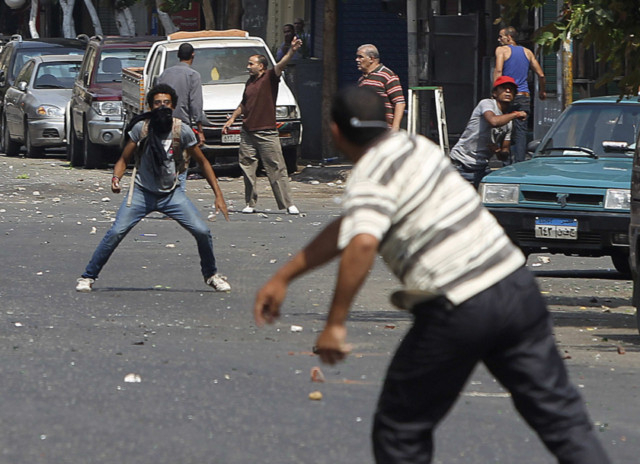
Cairo: Supporters of deposed Egyptian president Mohammad Mursi protested outside several ministries on Tuesday in further defiance of a government ultimatum to dismantle their sprawling Cairo protest camps.
Police fired tear gas to break up brief clashes that erupted between Mursi loyalists and residents of a central Cairo neighbourhood, AFP correspondents reported.
The confrontations began when dozens of religious scholars affiliated with Mursi’s Muslim Brotherhood entered the religious endowments ministry and were ordered out by police, a security official said.
The scholars were joined by more pro-Mursi protesters who damaged shop fronts. That further infuriated the residents, who pelted them with stones, leading to sporadic scuffles on several streets.
The clashes came as Mursi supporters demonstrated outside several government ministries.
Loyalists of the deposed president have set up two huge Cairo protest camps and have held near daily demonstrations for his reinstatement since his overthrow by the military on July 3.
The standoff with the army-backed interim government, which has threatened to disperse the protest camps where thousands of Islamists have been staying for more than a month, has sparked international fears of further bloodshed.
Clashes between pro- and anti-Mursi demonstrators and security forces have killed more than 250 people since the end of June.
Since police issued an ultimatum last week to end the protests, the Islamists have repeatedly called for new demonstrations.
The Anti-Coup Alliance called for a “million-man demonstration” as the judiciary extended Mursi’s detention on Monday for a further 15 days pending an investigation into his collaboration with Palestinian group Hamas.
Mursi’s backers set as their rallying cry: “Together against the coup d’etat and the Zionists,” in an appeal to nationalist sentiment after a deadly air strike on militants in Egypt’s Sinai Peninsula, which the jihadists said was carried out by an Israeli drone.
Israeli media say the Jewish state has been cooperating closely with Egypt over the threat from Sinai militants.
Authorities have announced plans to clear the pro-Mursi protest camps from Cairo’s Raba’a Al Adawiya and Nahda squares by “gradual steps.”
But the number of protesters in the squares has not diminished.
At Raba’a, the bigger of the two rallies, dozens of volunteer guards manned makeshift barriers of bricks and sandbags.
The Muslim Brotherhood, the group from which Mursi hails, insist that their demonstrations are peaceful, while the government and the press accuse demonstrators at Raba’a and Nahda of being “terrorists”.
They say the protesters are hiding automatic weapons in the squares and using women and children as “human shields”.
The government has struggled to come up with a clear strategy to end the protests, its members split between those who want to send in the security forces and those who want a negotiated solution, in deference to international appeals to avoid further bloodshed.
Police and army chiefs are ready to intervene, but the reticence of some top politicians, such as vice-president and Nobel laureate Mohammad Al Baradei, has led them to take a more cautious approach.
Rabab Al Mahdi, professor of political science at the American University of Cairo, said the demonstrations “are not sit-ins like any others”.
Authorities “are dealing with the most organised political force in the country. They know that the cost will be higher than the dispersal of past protests,” Mahdi said.
The Muslim Brotherhood, banned in 1954 and repressed by successive governments, won both parliamentary and presidential elections in 2011 after the ouster of veteran strongman Hosni Mubarak.
The Brotherhood is demanding the release of Mursi and other top party figures who were detained by the military on July 3.
Prosecutors have set an August 25 date for the trial of the Brotherhood Supreme Guide Mohammad Badie and his two deputies.
While Egypt’s political transition, which is intended to lead to elections in early 2014, has struggled to get off the ground, Al Azhar, Sunni Islam’s highest seat of learning, has called for national reconciliation talks.
Al Azhar’s grand imam Ahmad Al Tayyeb said he had invited all sides in the crisis to negotiate a compromise, but the Brotherhood said it did not receive any invitation and categorically refuse to hold talks with the “illegitimate” authorities.














